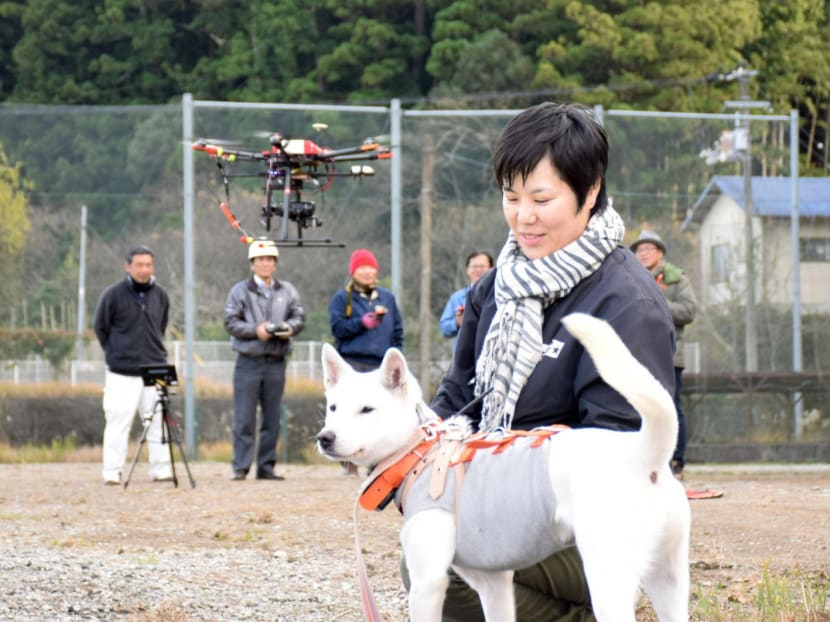Japan arms old hunters with new technology to beat pests
TOKUSHIMA (JAPAN) — A Japanese municipality, searching for a solution to the dual problem of an overpopulation of crop-damaging wild animals and a shrinking and ageing recreational hunting population, is looking for help from cutting-edge technology.

Naka in Tokushima prefecture conducted an experiment in which a hunting dog was tracked and located on the side of a mountain using a drone. Such technology will make it easier for elderly hunters to find their prey. Photo: Kyodo
TOKUSHIMA (JAPAN) — A Japanese municipality, searching for a solution to the dual problem of an overpopulation of crop-damaging wild animals and a shrinking and ageing recreational hunting population, is looking for help from cutting-edge technology.
In yet another downside to Japan’s greying society, the numbers of active hunters are falling, while the animals they hunt, such as deer and boar, have continued to thrive and inflict extensive damage on crops, an issue affecting many areas across the nation.
Against this backdrop, a small town in a mountainous area of western Japan is embarking on a project that utilises sophisticated technology, including drones, to aid less mobile and increasingly frail hunters in tracking their target.
Last December, Naka, in Tokushima prefecture, conducted an experiment in which a drone was used to track and locate a hunting dog in a mountainous area. In the experiment, a portable tracking device showed the location of the dog more than 900m away on the side of a mountain.
Although the project is in an experimental stage, a town official said the technology can “reduce the difficulty for aged hunters to track their hunting dogs in the mountains”.
If hunters can track their prey-finding hunting dogs using technology, without needing to traipse across large swaths of territory, it becomes much easier for the gun-toting grandpas to get their shot. Along with the ageing issue, there has also been growing concern over shooting accidents due to elderly hunters’ worsening mental agility.
According to the National Police Agency, there were 52 fatal accidents involving hunting guns across the country between 2006 and 2015. Twenty-five cases were caused by misfires, while 16 were due to hunters mistaking humans for animals.
In Naka, a man in his 70s accidently shot and killed an 82-year-old neighbour while hunting wild monkeys on a farm road. The man was held criminally responsible for the August 2015 killing.
The hunter said at his trial that it had been difficult to recognise his neighbour, as bamboo leaves had hampered his view when he was taking the shot.
An aged hunter from Tokushima said that “sometimes, we need to react quickly to shoot monkeys” because they are agile, providing some explanation as to how the tragedy unfolded.
Many local municipalities, however, have no choice but to rely on elderly hunters, officials said.
According to the Tokushima prefectural government, the number of people who obtained a hunting licence or renewed it in the prefecture in fiscal year 2015 totalled about 2,900, less than half of those in previous years. And nearly 70 per cent of them are aged 60 or older.
There used to be many people who hunted for food or to obtain pelts for leather products, but now the population of hunters, notably younger hunters, is declining due partly to the time-consuming process of obtaining and renewing shooting licences.
To buck the trend, the prefecture holds regular workshops where veteran hunters teach students how to use guns and traps.
To help reduce crop damage, the prefecture also set up a website with photos of wild animals taken by residents, to show the location where pests were seen.
Associate Professor Naoki Naito of Tokushima University, who works to encourage young hunters, said: “A lack of new hunters and the ageing group of current practitioners could lead to accidents. There is an urgent need to create an environment where veterans can pass their skills down to younger generations.” KYODO NEWS






